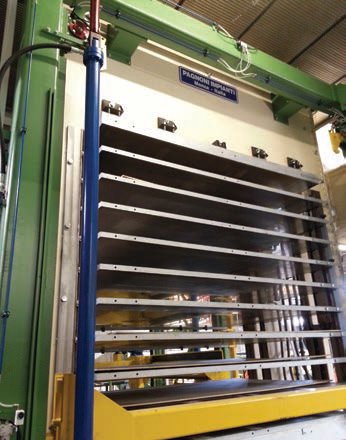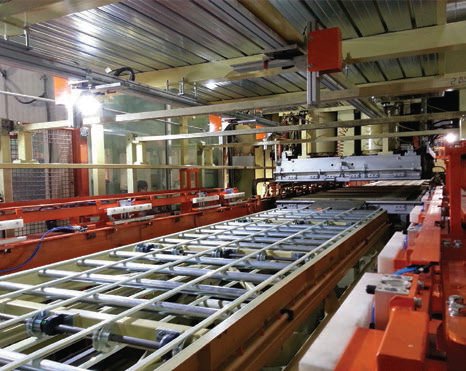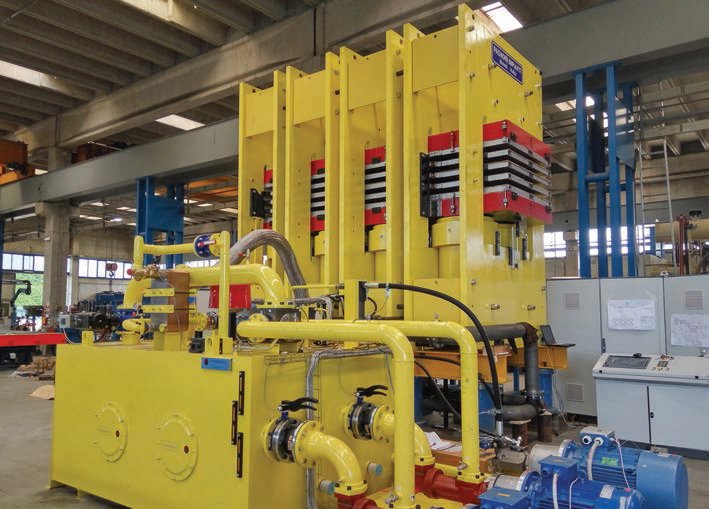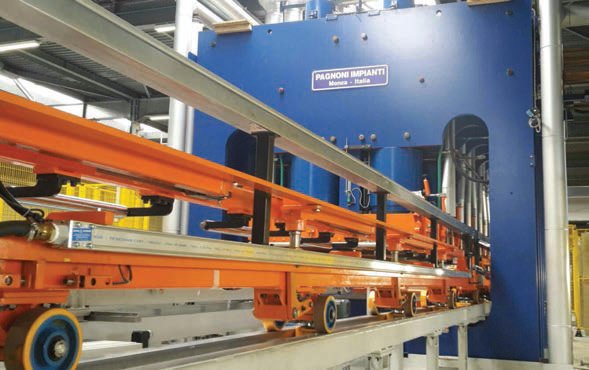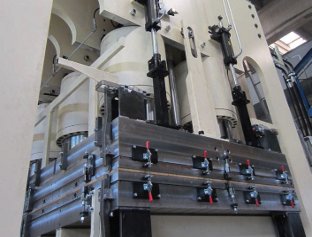Leading the way
9 November 2018Pagnoni is the longestestablished company in Italy to be involved in the panel industry. However, the company is still at the cutting-edge today, as Mike Botting discovered when he visited its factory
Founded in 1848 in Monza in the north of Italy near Milan, the original Pagnoni can in fact claim to be older than the state of Italy itself.
In order to survive for that long, this family-owned business has of course had to make more than a few changes along the way. For example, its massive original factory, while an iconic piece of industrial heritage, was far too big for modern day requirements. The company thus relocated to much more practical accommodation some years ago, though still not far from that original factory.
Pagnoni began by making olive and wine presses before it entered the panel making field and the company today is still a specialist in pressing technology for panel manufacture and downstream processing – often for niche markets – and it has plenty of work on its books.
“Over the last two years, we have seen a big increase in our business,” said Dr Michele Pagnoni, head of the technical department of his family’s business. “This has involved new types of contracts and new technologies and my department has been busy finding new solutions for our customers’ requirements.”
One of Pagnoni’s latest projects was the installation of a very large new press line in panel manufacturer SIT’s factory in Mortara in northern Italy. This company is part of the large Italian Mauro Saviola group which is an ecological panel maker and processor, as well as being a maker of furniture components. It has several subsidiary companies around Italy.
“That short-cycle press [SCP] at SIT is 5.6m long and 2.1m wide and is running at 180 cycles per hour,” said Mr Pagnoni. “It is a very flexible line and is equipped with mechanisms for the very fast changing of raw materials [panels and papers]; as well as press plates for finished surfaces. This is a good example of where we found solutions to meet the big capacity demands – and the flexibility in operation – required by the customer.” This short-cycle press line includes an embossed-in-register system and Pagnoni has installed similar EIR systems in all Saviola group SCP lines, as previously reported in (WBPI August/September 2014).
“The press line for SIT started-up in March/ April 2018 and is running three shifts per day,” said the technical manager. “This is the second such large SCP line we have manufactured and installed: in 2017, we supplied a similar-size line to Fantoni in the Friuli region in the east of Italy.”
Before the Italian Trombini Group was purchased by Kastamonu of Turkey, Fantoni bought an SCP line from Trombini and moved it to Friuli, explained Mr Pagnoni. Fantoni requested new loading/unloading systems and many new press parts. “In fact this was substantially a new line,” he said.
“We are also working with Kastamonu in the Pomponesco factory which it also bought from Trombini.
“When the Turkish company purchased the factory, it had a 13m SCP capable of processing two or three panels at a time. It was a 2003 line and this year we renewed the platens and cylinders and carried out a full modification and updating of the line,” said Mr Pagnoni.
“So, in Italy, we have had a lot of work in the last two or three years in short-cycle pressing. However, up to 2016, we had very little work in this country: In fact only one HPL [high-pressure-laminate] line.”
But it’s not just Italy that has provided work for the Pagnoni company. It has also been active in many countries outside Italy. One such export project is an SCP line for a customer in Algeria, where Pagnoni supplied one of it’s ‘Selecta’ lines.
“This is a simple line designed specifically for developing countries, with lower purchase cost, lower capacity and easier maintenance,” explained the technical manager. “For these inexpensive lines, all the machines are still made in Italy by us and our selected Italian sub-suppliers.”
In July, Pagnoni was due to deliver a single-daylight line for HPL to a customer who is trialing the manufacture of coins from HPL using EIR, but this is a top-secret project, for obvious reasons!
“We have also supplied a multi-daylight HPL press to Russia, specifically for the production of Compact Laminate,” said Mr Pagnoni. “Traditional multi-opening HPL lines have a very complicated system for the movement of the caul plates and the cost of these systems is very high.
“For Compact Laminate, the press cycle is completely different to that for thin HPL, so we developed a system for the transport of the caul plates and also offered a cost-saving for finishing plates, meaning that less plates are required.
“The line can process up to three HPL Compact Laminate boards per daylight, if the thickness permits.”
Mr Pagnoni also pointed out another issue with such Compact Laminate lines. This is the problem of heating and cooling of the panels, where there must be precise control if flat panels are to be produced at the end of the process. He said that his company had thus developed a very accurate temperature control system.
“Another major development we have made for our customers is a new system for paper sheet counting,” said the technical manager. “This means 20, 30, 50 sheets at a time and that counting is currently done manually. So we are developing a system to automatically count the papers and to move them into the process.”
Now, he added, Pagnoni is also in “big negotiations” for the phenolic facing of plywood. This phenolic-faced plywood is widely used in re-usable concrete shuttering, in truck bodies and in heavy-duty flooring, among other applications.
“We are always trying to find tailor-made solutions for our customers – that is our strength, partly because we are a smaller company and therefore more flexible,” said Mr Pagnoni.
“In 2016, we supplied a large plywood press to a customer in Italy and now we are negotiating with plywood manufacturers abroad for new contracts. This means eastern Europe – particularly the Balkan area – as well as the Ukraine and Belarus.”
Concluding our interview, Mr Pagnoni said: “It’s important to be able to follow our customers’ requirements and to give added value to our machinery and our technology and process know-how. We can only do that if we know the process inside out. We are always there beside our customer at the start-up of the plant.
“And we are happy to celebrate 170 years of Pagnoni in 2018.” I wonder if any other company in our industry can match or exceed that achievement? I doubt it very much.
